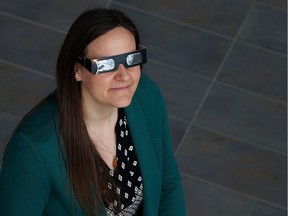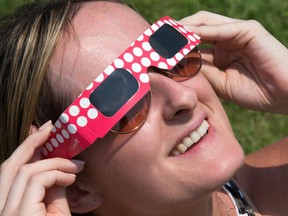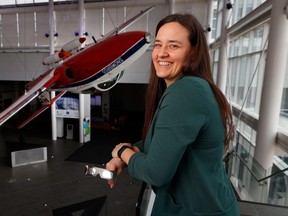Why is it dangerous to look at an eclipse? How can you tell if your eclipse-viewing glasses are safe? We’ve got the answers.

Article content
Joshua Smith is hoping for clear skies on April 8th so he can view the rare total solar eclipse with his young son, who will be home from daycare that day.
What he’s not hoping for are new patients at his Cornwall, Ont. optometry clinic.
Article content
“There’s this big concern that after Monday, April 8th, we’re going to spend the rest of the week seeing people in with solar retinopathy,” Smith said. “That’s not just something we can just prescribe medication for and correct. The effects are long-lasting.”
Advertisement 2
Story continues below
Article content
Why is it dangerous to look at an eclipse?
Solar retinopathy, sometimes called eclipse retinopathy, is the permanent eye damage that can occur by gazing directly at the sun. Normally, the sun is so bright we flinch and look away. During an eclipse, however, the brightness is so diminished that that natural instinct won’t kick in.
Even with the sun 98 per cent obscured, as it will be in Ottawa, the damage can be irreversible.
“Practically, it’s never safe to look at the sun without protection. Even the little bit of sunlight that’s coming through can burn, literally burn, your retina,” Smith said.
“There are no pain sensors in the retina. That burn won’t cause any pain that would make you look away. You won’t even know that you have it until your vision becomes blurry, perhaps hours or days afterward, or until an eye exam shows retinal damage,” he said.
How badly can looking at an eclipse damage your eyes?
“If you think of the retina as a dartboard, the fovea is the bullseye,” Smith says. “it’s the centre of our vision.” If the damage affects the fovea, the vision loss can be in orders of magnitude, or even complete blindness.
Advertisement 3
Story continues below
Article content
“If the burn is bad enough, it will leave a blind spot and, unfortunately, because you’re looking directly at the sun, it will be right in the centre of your field of vision. It can be extremely debilitating. Anything that turns into a scar is going to stay a scar.”
Smith has seen several cases of solar retinopathy in his career, some in people who mistakenly believe staring directly at the sun provides health benefits — it doesn’t.
How can you look at an eclipse safely?
One of the best sources of information on viewing the eclipse safely is the Ontario Association of Optometrists, which provides extensive information on its website: opton.on.ca.
Eclipse safety starts with using eclipse glasses that meet the international standard of ISO 12312-2, which is sometimes appended with :2015 (the year it was adopted). While that is the standard, the glasses must also be marked as certified — CE — by a second authority.
Regular sunglasses, even polarized ones, aren’t safe for eclipse viewing.

How can you tell if your eclipse-viewing glasses are safe?
The incredible interest in the April eclipse has led to bogus glasses being sold online, some printed with counterfeit ISO certification. Smith recommends buying from a reputable company.
Advertisement 4
Story continues below
Article content
The Ontario Association of Optometrists’ website includes a list of manufacturers recommended by the American Astronomical Society.
“If you can see ordinary lights through the glasses, they’re not safe for viewing the eclipse,” he said.
Those lucky enough to be within the path of totality, a roughly 184-kilometre-wide swath that stretches across North America, from Mexico and Texas in the southwest to Newfoundland in the northeast, will see the sun completely obscured by the moon. For the few short minutes of totality, it is safe to look with the naked eye. But it’s vital to have your eyes protected again before the sun emerges.
Map: Path of the 2024 Solar eclipse on April 8
Is it safe to drive during an eclipse?
“The sun is no more dangerous during an eclipse than it is any other day,” Canada Aviation and Space Museum Ingenium science advisor Cassandra Marion said. “But now that there’s something to see, we’re forcing our body to ignore that reflex (to look away) and watch the show. If you don’t have a pair of eclipse glasses, you can still go outside. You can still drive to work. Just don’t look directly at the sun.”
Advertisement 5
Story continues below
Article content

How can you safely take pictures of an eclipse?
It’s not just your eyes that need protection. Cameras and smartphones can be permanently damaged if used without protection. Camera companies sell specially made solar filters for lenses, although they are in short supply as eclipse day nears. To use your smartphone for a picture, it’s possible to simply hold your eclipse glasses in front of the lens.
But one of the easiest ways to view the eclipse is also the simplest: a pinhole camera can be used to safely project an image of the sun onto a sheet of paper. Easier still, stand under a tree and watch as the leaves filter a projection of hundreds of tiny shimmering crescents on the ground as the sun is eclipsed.
How to tell if you’ve damaged your eyes looking at an eclipse
Viewing the eclipse without proper eye protection can lead to permanent eye damage. Be alert for these symptoms in the hours and days after the April 8th eclipse:
- Blurry vision
- Eye pain or a feeling of grittiness in your eyes
- Distorted straight lines that look bent, such as a curvy door frame
- A blind spot in the central vision of one or both eyes
- Increased light sensitivity
- Dychromatopsia, that is, a change in the way you see colour
(Source: Ontario Association of Optometrists optom.on.ca)
We want to hear from you: How are you prepping for the total solar eclipse, Ottawa?
Our website is your destination for up-to-the-minute news, so make sure to bookmark our homepage and sign up for our newsletters so we can keep you informed.
Recommended from Editorial
Article content


Comments